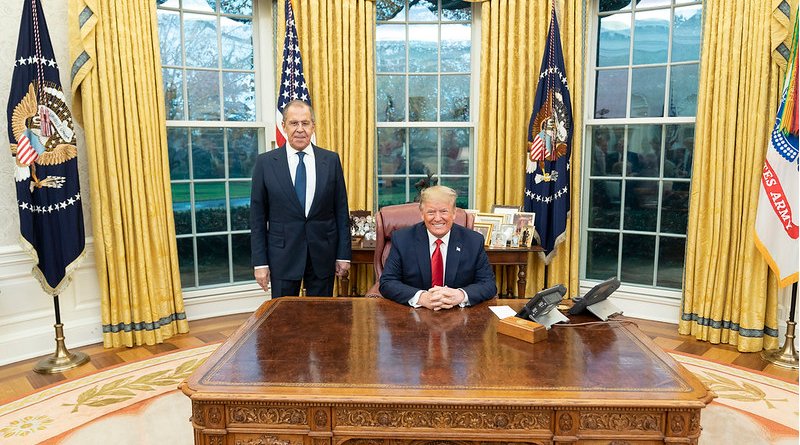Foreign Policy To Play Key Role In 2020 US Election – OpEd
By Arab News
By Andrew Hammond*
Russian Foreign Minister Sergei Lavrov on Tuesday met with Donald Trump, while the House of Representatives moved closer to impeaching the US president. The impeachment process will shape US domestic politics in 2020, but it will also increasingly bring foreign policy into focus in the election year, given the Ukrainian dimension to the affair.
There are already growing signs that the Democratic presidential candidates, who have so far mainly focused on domestic policy in debates, are dialing up their foreign policy focus. Meanwhile, the president believes that his international policy is one of the strongest reasons for his re-election in 2020.
This combined emphasis on foreign policy will mean that the 2020 campaign will be especially eagerly watched not just in the US, but right across the globe. Part of the reason for the global interest is the massive international concern about the prospect of Trump getting re-elected. This was illustrated in data released last week by Pew Global, which showed that, in a significant number of countries, domestic populaces decreasingly see the US as the ally they can most depend on. Take the example of three key US allies in Asia-Pacific. In India, there was a 12 percentage points fall between 2014 (when Barack Obama was president) and 2019. Meanwhile, in the Philippines the drop-off was 19 percentage points, and in Indonesia it was 12.
Within the US itself, it is also likely that foreign policy will be a significant issue on the minds of the electorate. This is not just because of the controversies over Trump’s Ukrainian policy, but also continuing wider concerns regarding his stance on vital international allies, not to mention his unorthodox policies toward states of longstanding US concern, including Russia.
In the last US presidential election year in 2016, the very high salience of international issues in the campaign was illustrated in a separate Pew survey that found 34 percent of the population believed foreign policy, especially tackling international terrorism, was then the biggest challenge facing the country. By contrast, “only” 23 percent mentioned economic problems. That data showing a higher salience of foreign policy compared to economic issues was very unusual in the context of the past few decades. Indeed, it resembled the first 25 years of the Cold War, from 1948 to 1972, when international security issues dominated the concerns of US voters during campaigns.
While foreign policy may not prove to be quite as important for voters in 2020 as it was in 2016, there are a significant number of reasons why international affairs will be prominent. In part, this is because Trump has — unlike many presidents in the modern era — put a very significant amount of emphasis on foreign policy in the first three years of his presidency. International affairs have been a surprisingly big feature of Trump’s time in office so far, from China to North Korea and Iran to Russia, not to mention multilateral trade, from the proposed US-Mexico-Canada agreement to pulling out of the Trans-Pacific Partnership deal. This pattern looks set to continue in 2020.
The US is, for instance, hosting next year’s G7, which will occupy a significant amount of White House attention. In placing so much emphasis on foreign policy, Trump has replicated a pattern of most recent second-term presidents, who have tended to increasingly look overseas after re-election. This has often been done for reasons such as the search for a legacy, and the “lame duck” factor, which sees power drain from presidents as they approach the end of their second term, as they cannot serve more than eight years.
There are at least three areas where Trump is seeking significant achievements in the coming months: Iran, North Korea and China. Take the example of North Korea, where it remains an open question whether sustained moves toward the “denuclearization” of the Korean Peninsula will ultimately prove anything more than a mirage. Trump is likely to continue his Korea gambit with election year on the horizon. This, along with his desire to cement a place in history, means the potential prize of permanently de-escalating tensions in the world’s last Cold War frontier is likely to remain appealing to him.
At the heart of the apparent logjam between Washington and Pyongyang right now is not just the vagueness of the commitments agreed in Singapore. There also appears to be a fundamental difference between Pyongyang and Washington over what next steps are needed to build confidence.
It was always very likely that Kim Jong Un would be wary about making big concrete commitments, and would want to win economic and political concessions from Trump before any reduction in nuclear capabilities, let alone committing to “full denuclearization.” The next few weeks could be key, with Pyongyang putting an end-of-year deadline on significant progress being made, or it is threatening “a different path to the one promised” at Singapore.
This underlines why 2020 could be a significant year for US foreign policy. Trump could yet enter election year with a foreign policy tailwind behind his campaign, or continue to be flummoxed by challenges that have long bedeviled him, with the US populace and the world at large watching.
- Andrew Hammond is an Associate at LSE IDEAS at the London School of Economics.

